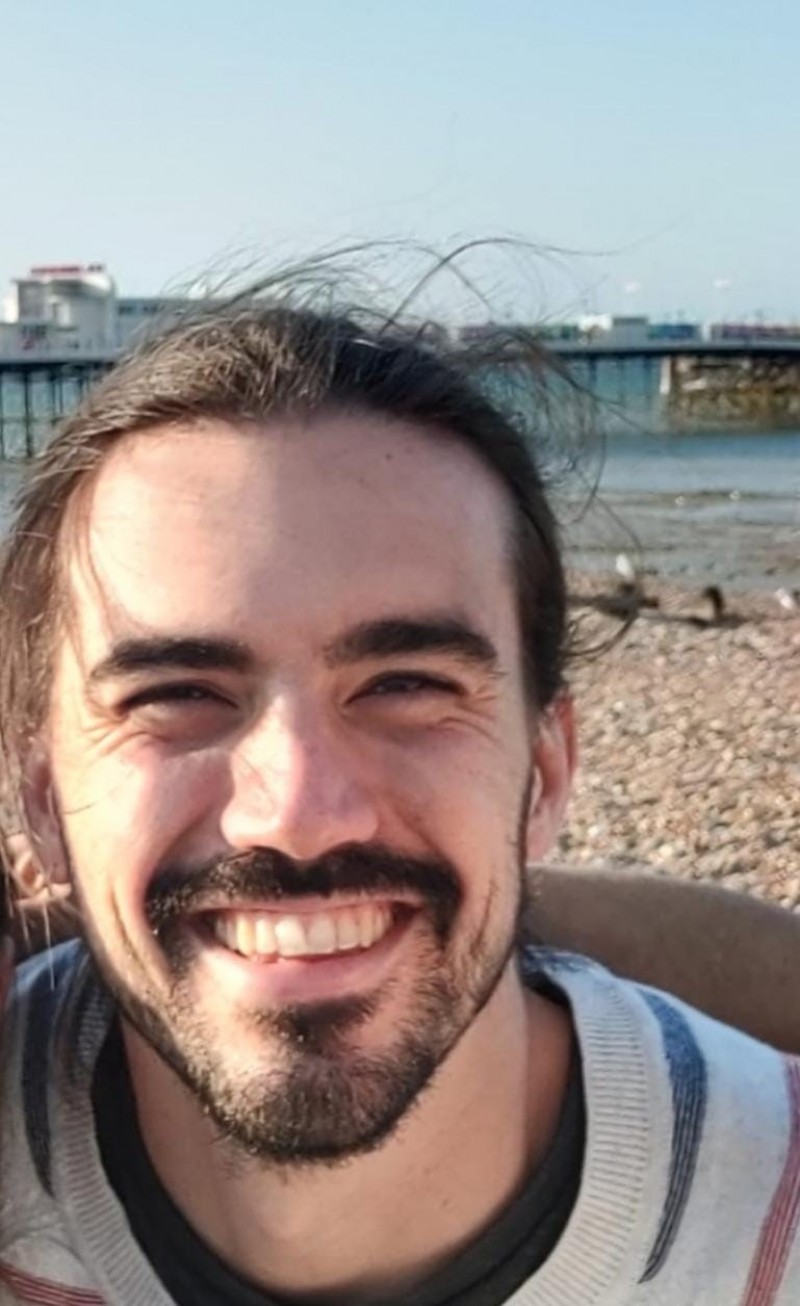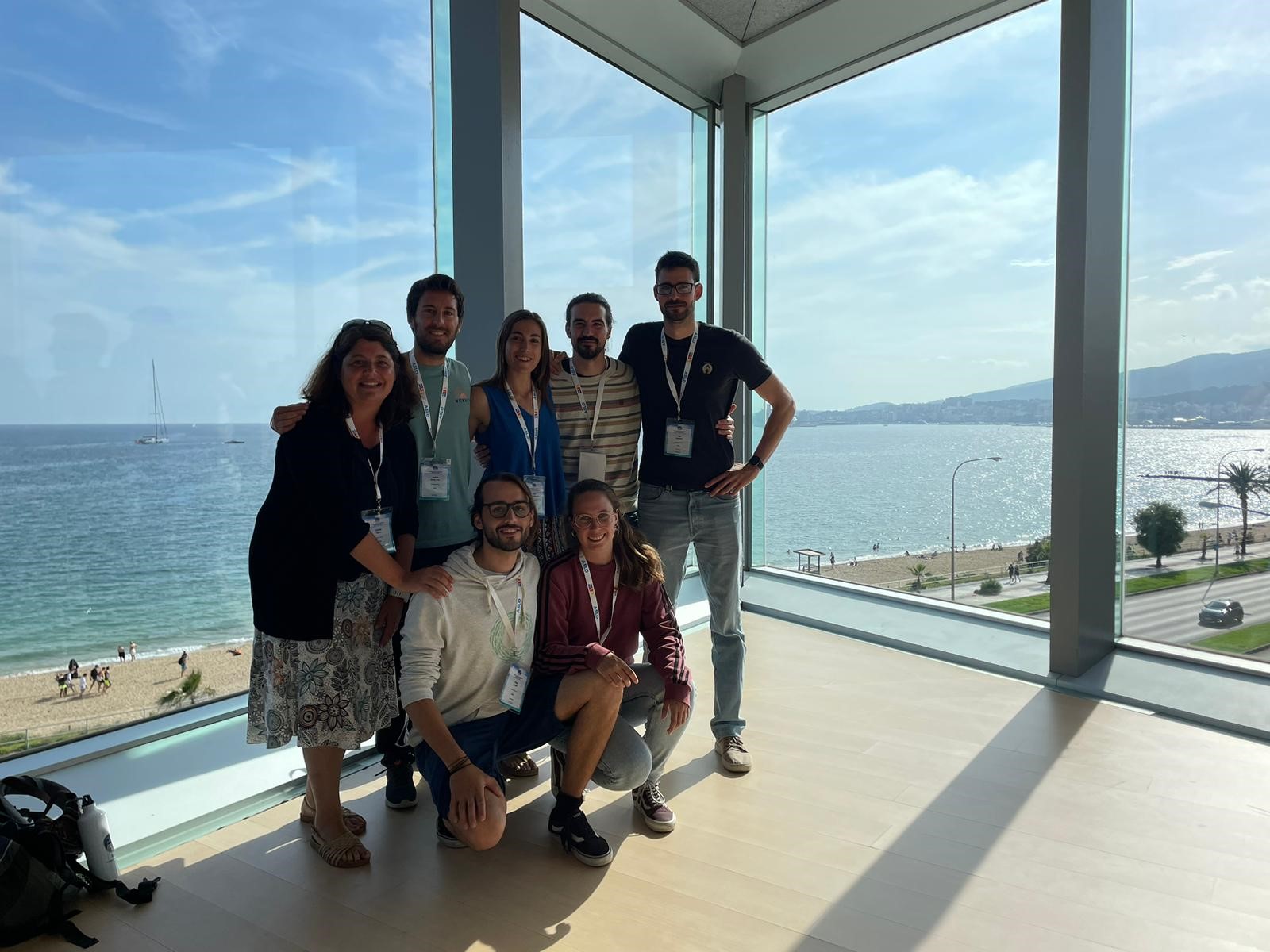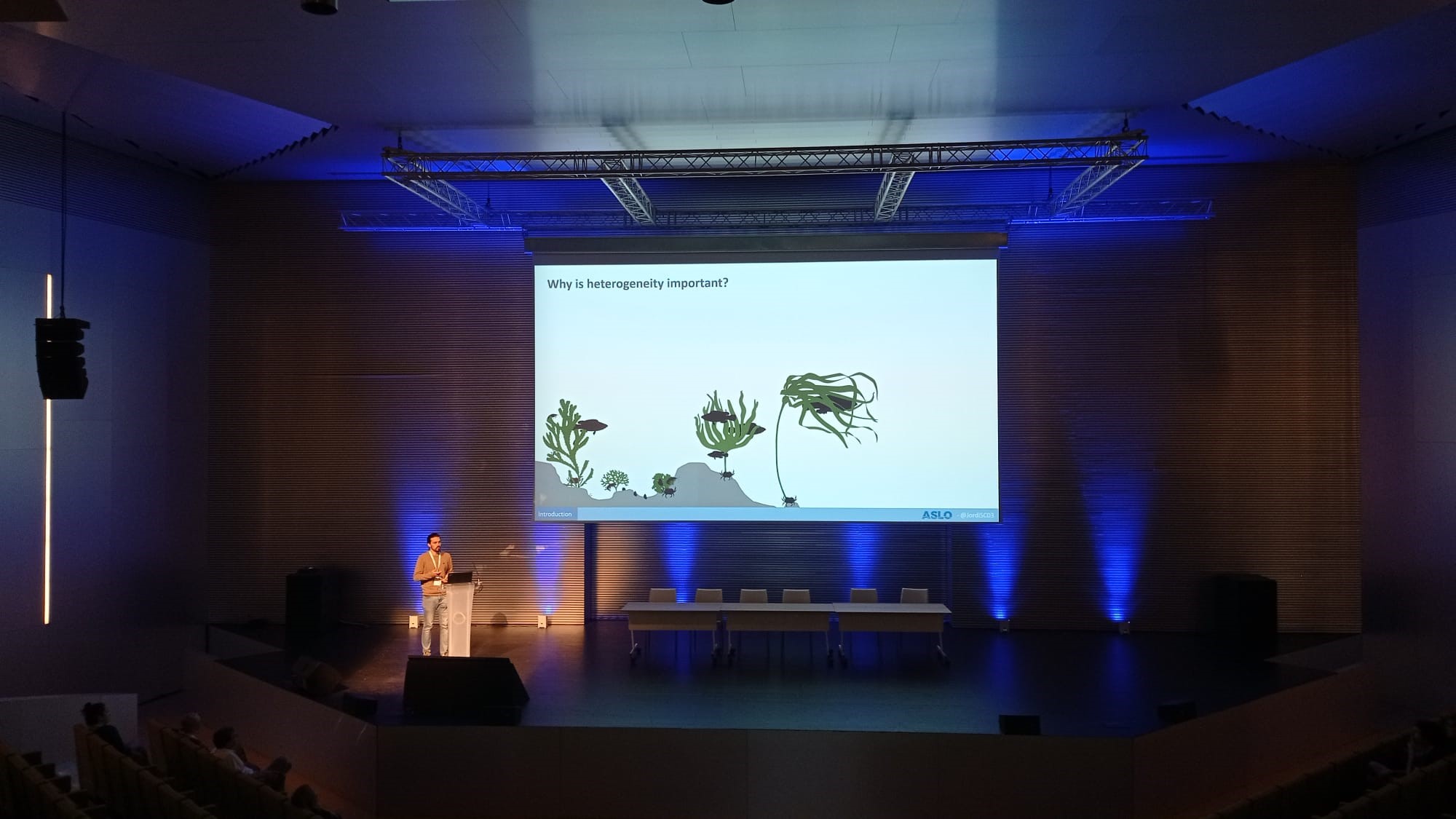The Association for the Sciences of Limnology and Oceanography Aquatic Meeting 2023 (ASLO 23)
Jordi Sola
Swansea University

In June 2023, I swapped the British weather for a dose of sun, sea and marine science in Mallorca. Thanks to the Challenger Society Travel Award, I was able to attend and participate in the Association for the Sciences of Limnology and Oceanography (ASLO) Aquatic Meeting 2023 which took place in Palma de Mallorca between June 4th-9th. This was my first time giving an oral presentation in an international conference; and although the experience of presenting to an auditorium was a nerve-racking one, this meeting had much to offer.
ASLO has a long tradition of holding international meetings. Every 2 years, aquatic ecologists from around the world gather to discuss a vast array of research topics. This meeting is one of the largest gatherings for aquatic ecologists; touching on a range of subjects from physical oceanography to citizen science and diversity in science. This year’s theme, the resilience of aquatic systems in the face of global change, was linked to my research and allowed me to explore various topics with a focus on climate change and ecosystem stability. This wide range of topics linked to resilience also helped highlight the transdisciplinary nature of much of current ecological work.
A number of plenary talks set the tone for the general meeting and offered the opportunity to learn from world-leading researchers; giving a bird-eye’s view of their research and discussing how to tackle the crucial issues facing our oceans today. For example, the need to refocus the ASLO society’s efforts in engaging with the climatic, environmental and related societal issues facing our planet, the state of coral reef conservation and restoration, the importance of appropriate management for global fisheries, the application of conservation approaches in coastal communities, and the benefits and challenges derived from them.
Concurrent special sessions, prepared by research groups from external institutions, took a deeper dive into individual topics. These included talks from leading researchers in each topic area on their latest research. This alone made all the hectic runs between the eleven rooms, holding simultaneous sessions, worthwhile. The varied talks allowed me to connect topics as different as energy transition effects on ecosystems, ecological tipping points, marine heatwave effects on ecosystems, blue carbon, ocean acidification and habitat restoration within a single morning!
Caption: In between sessions, we got to enjoy the views to Palma Bay from the venue.
We also had poster sessions every evening. A lot of interesting chats with other students sparked unexpected connections and fuelled our common interests in the marine environment. This was one of the most sociable moments in the conference, where students and researchers mingled and discussed a long range of topics. These one-to-one chats gave a lot of insight into topics that had been discussed during special sessions, and it was a great chance to meet people with similar topics of research.
Finally came the last day, and with it my time to present. My talk focused on the role of substrate topography (i.e. heterogeneity and complexity) and quantitative appraisal of its effects in rocky shore communities around the globe. Using data from 150 studies, I looked into how different forms of heterogeneity increased diversity, abundance and biomass in communities, what organisms are most benefited by heterogeneity, and the local and geographical drivers behind these effects. I enjoyed the discussion afterwards, which focused on the effect of human impacts on these heterogeneity effects. This talk marked an important personal milestone, since it was the first time presenting the final results from my PhD to an international audience.
Caption: Giving my presentation on local heterogeneity effects in rocky shore communities across latitudes, organismal groups and depths.
Overall, ASLO opened a window to the world’s state-of-the-art marine research. It provided an opportunity to meet many researchers at different career stages, allowed me to listen to and participate in discussions on new developments in aquatic sciences, and gave a valuable insight into future opportunities and collaborations. I am incredibly grateful to the Challenger Society for their support in my attendance, and I am looking forward to attending ASLO meetings again in the future!
Profile
I am a final-year PhD student at the Biosciences Department at Swansea University. My PhD research focuses on the role of habitat heterogeneity and complexity in driving the structure and functioning of rocky shore communities. This has involved a field experimental approach - looking into niche theory, temporal community stability, spatial scales and biodiversity-ecosystem functioning relationships - and synthesising literature to expand these relationship across latitudes, depths, organism groups and a range of metrics.
Latest News
Marine Data Management, Governance and the MEDIN toolset
The Marine Environmental Data and Information Network (MEDIN) and OceanWise are delighted to invite you to attend our popular free online training workshop: ‘Marine Data Management, Governance and the MEDIN toolset’ on the 19th – 23rd of May 2025.
Workshop on the contribution of UK Arctic Ocean science to the International Polar Year 32/33
12:00 11th June – 16:00 12th June 2025: NOC Southampton (In-person with online option): Registration deadline 16th May
REGISTER HERE
Pre-meeting questionnaire (open to all)
The purpose of this workshop is for the UK Ocean Science community to discuss and then draft a prospectus document outlining the priority Arctic research questions the community would like to address during the run up to, throughout and beyond the International Polar Year 32/33. Additionally, to identify what unique strengths and technologies the UK has to help fill these knowledge gaps.
The second day of the workshop will be dedicated to writing groups, one for each of the priority research questions identified - from both the pre-meeting questionnaire (HERE) and day one discussion. By the end of the meeting, each group will have produced draft text and sourced supporting figures for the prospectus.
Post meeting, the draft will be opened for comments and suggestions from everyone, regardless of whether they were able to attend the workshop or not. It will then be shared with UK funders (UKRI, FCDO, DSIT, ARIA) and potential international programmes with whom we would like to collaborate (e.g. Arctic 2050, Norway). It will form a basis from which wider integration with terrestrial, atmospheric and cryosphere communities can be built, e.g. at the UK Arctic Science Meeting in September in Northumbria.
To ensure balanced community and ECR representation, and to ensure that the size of the writing groups is efficient and effective, if the number of registrations from individual institutes becomes overwhelming, we may contact individuals or teams and ask that each institute selects a smaller number of individuals to attend in-person. Please wait for confirmation of in-person attendance before finalising travel arrangements.
The workshop will be open to hybrid attendance and contributions on both days.
Challenger Society Council Position Vacancy
The Challenger Society for Marine Science (CSMS) are pleased to announce an exciting opportunity to support the next generation of ocean scientists and innovators. CSMS are looking for a new Council member to fill the Student Travel Awards and Stepping Stones Portfolio. The successful applicant will administer the travel and research grants available for Early Career Researchers.
The role involves:
- Receiving applications for the two schemes and responding to applicant inquiries
- Soliciting and compiling input from the rest of the Council for assessing the applications
- Communicating with successful and unsuccessful applicants for the two schemes
- Working with the Honorary Treasurer on allocating funds to successful applicants
- Following up with award winners on their reporting requirements
- Attending Council meetings four times a year (in person or online) and contributing to discussions and decision making for CSMS
The usual term for Council members is three years.
For more information about the CSMS Council, please follow this link: https://www.challenger-society.org.uk/The_Council
For more information about our Early Career Researcher grants and awards, please follow this link:
https://www.challenger-society.org.uk/Stepping_Stones
and
https://www.challenger-society.org.uk/Travel_awards
If you are interested in applying or have any questions regarding the role, please contact kathen@bas.ac.uk
